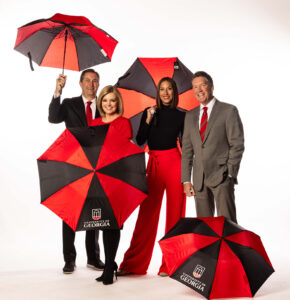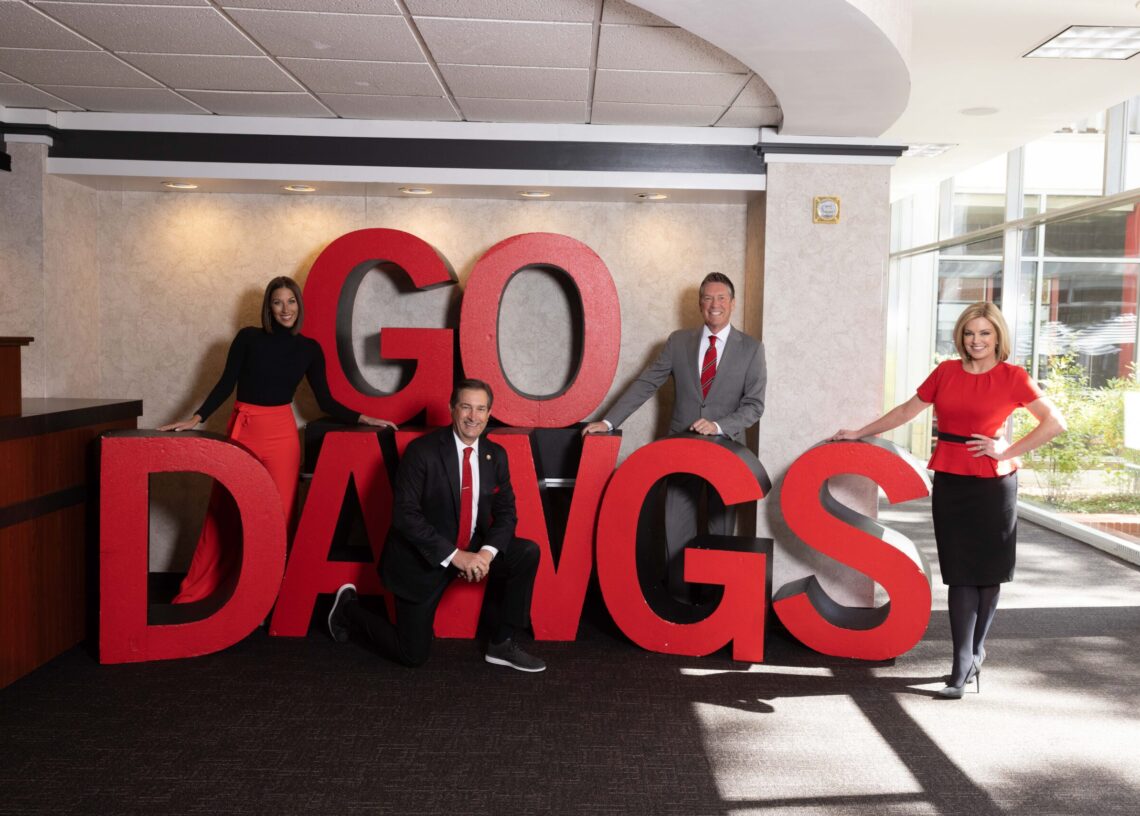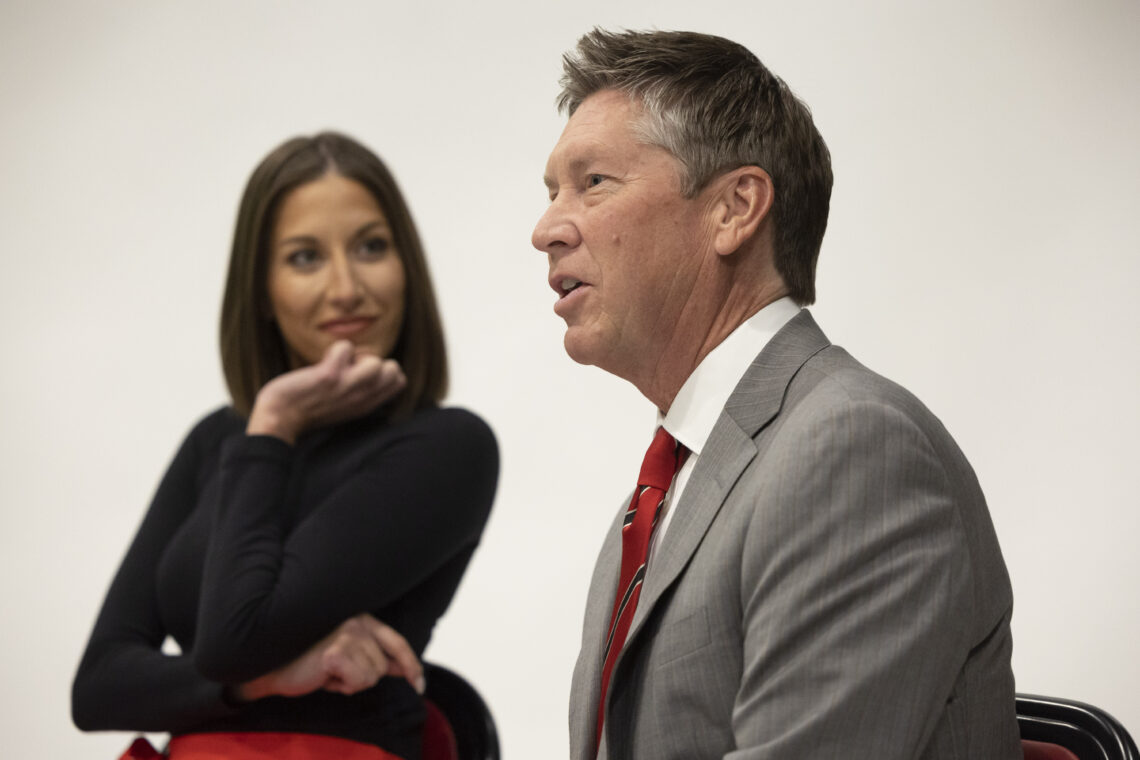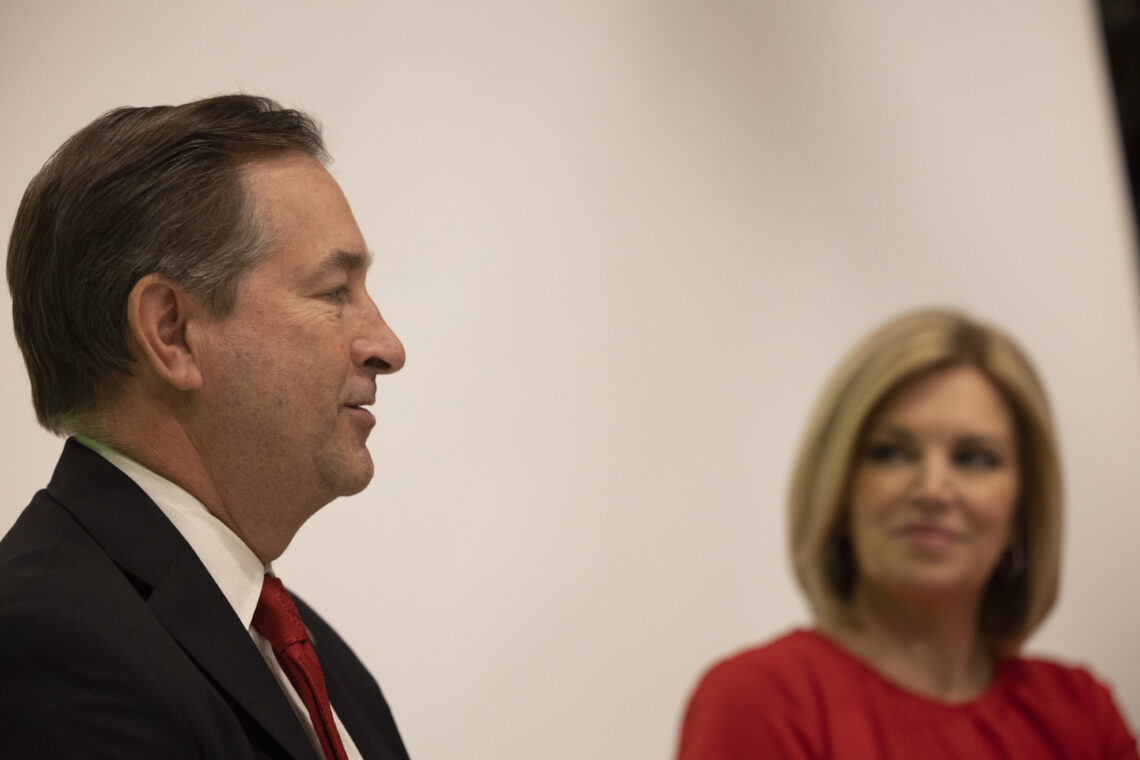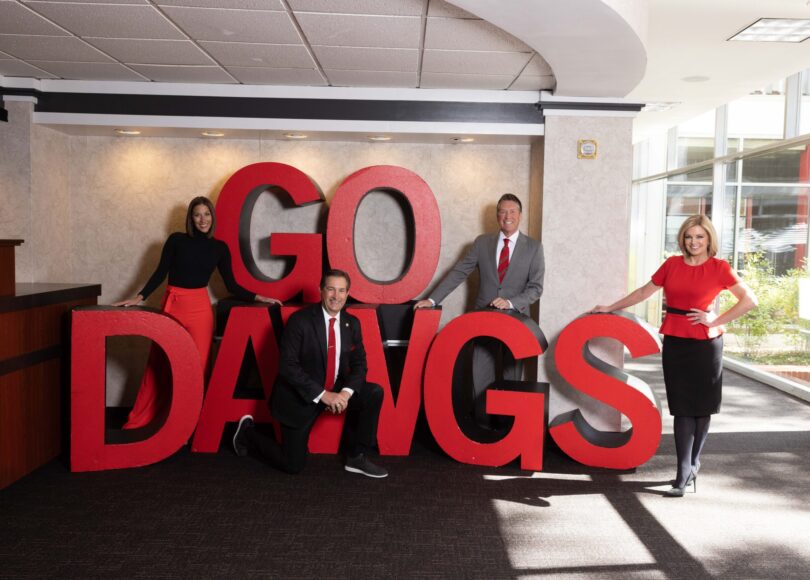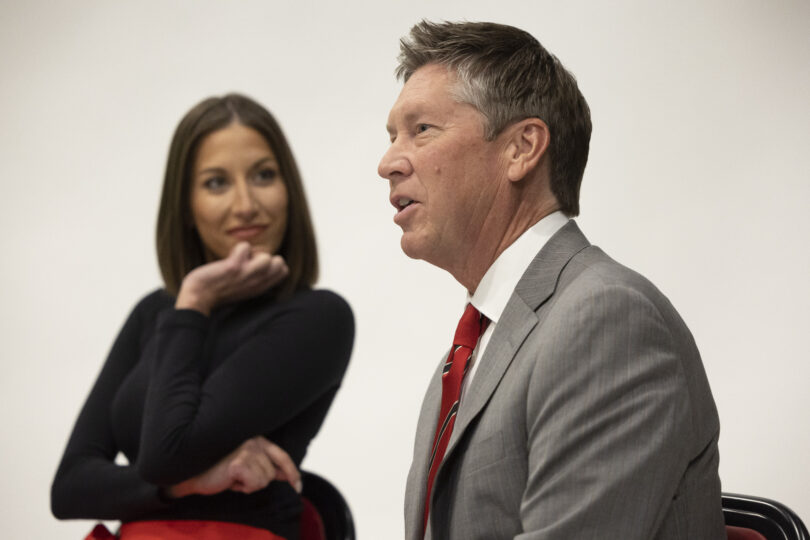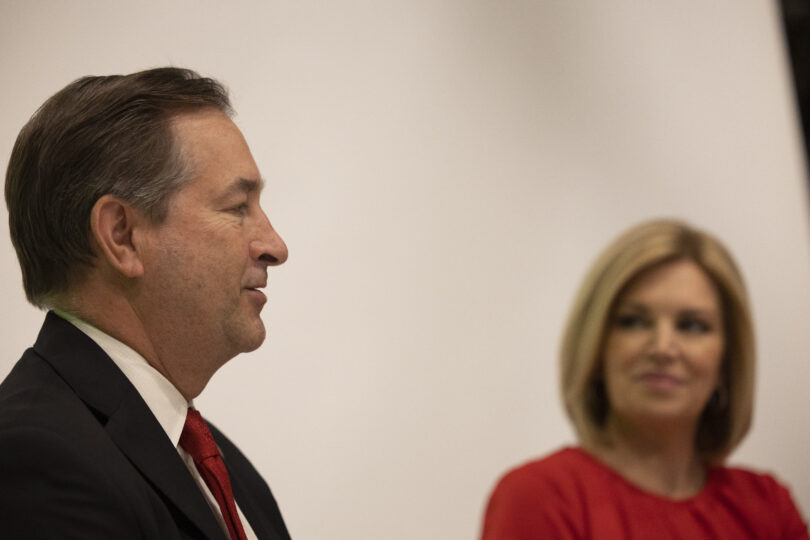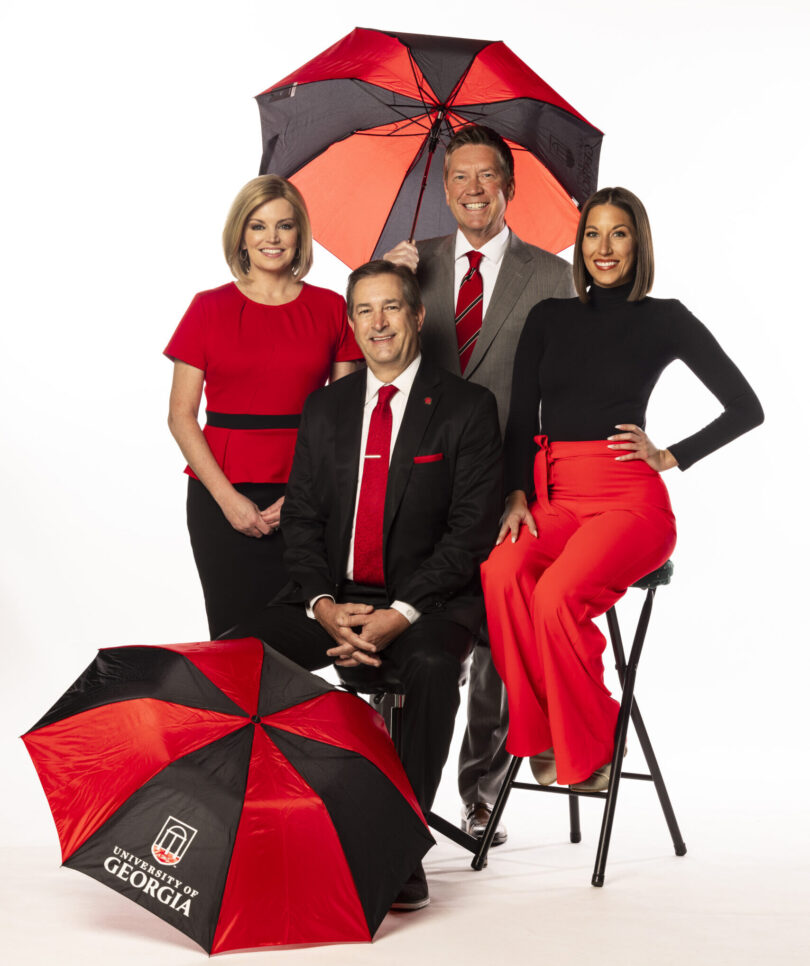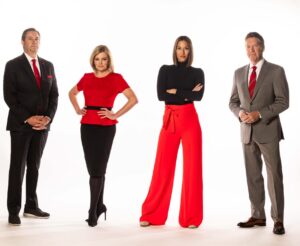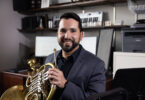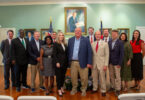What’s the weather like today? In Atlanta and across north Georgia, hundreds of thousands of viewers tune in to local news every day to find out. Some of the most trusted weather voices are UGA alumni. On-camera meteorologists David Chandley, Joanne Feldman, Ella Dorsey, and Chris Holcomb visited Athens to talk with Georgia Magazine about the weather, why it’s important, why they chose their career, and how UGA helped them get there.
Written by Eric Rangus MA ’94
Photos by Chamberlain Smith ABJ ’18
Video by Edwin Hammond ABJ ’03
Eric Rangus MA ’94
Editor | Georgia Magazine
The TV industry is a business, and it’s very competitive. But you all get along well. How do you balance that?
Chris Holcomb ABJ ’85
Chief Meteorologist | 11Alive/NBC
David and I have been friends for a long time. We go way back to our Macon days. And we’ve talked about how we were friends before we were competitors. And there’s always that line of things that we don’t talk about, because it is a competitive business. But we’re friends first, and, of course, we have this connection with UGA as well. So that brings us together even more.
Ella Dorsey BS ’13
Meteorologist
Weekday Mornings | WANF/CBS
When I interned for WSB 12 years ago, David was there. And I’ve always looked up to Joanne and Chris. So now just to get to work in the same market as them feels almost unreal. I see them as meteorologists who have really paved the way—especially Joanne—for women in this industry, in top markets, and also in mornings.
David Chandley ABJ’84
Chief Meteorologist | Fox5
Even as an intern with little experience, Ella was very comfortable in front of the camera. I recall she was passionate about the weather and eager to start her career. 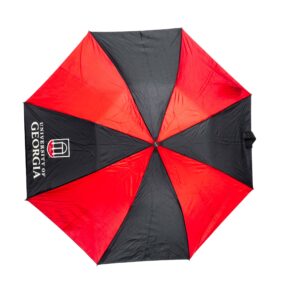
Joanne Feldman BS ’98
Meteorologist
Weekday Mornings | FOX5
Yes, we do a brutal shift in the mornings. Both of us. But back to that idea of friends versus competitors. When I was in college here, I remember watching David and Chris before I even made the decision that this is what I wanted to do. You feel like you already know everyone in this community before you even have to think about looking at them as being part of the competition.
GM: Joanne, when did you realize that this is what you wanted to do?
Feldman: My path at UGA was actually very winding. I came in as a theater major and eventually switched over to journalism. Somewhere along the way, I kind of stumbled into Weather and Climate 101. Something clicked, and I loved it. And I realized that I had always had an interest in weather. It just never dawned on me that it was something I would want to do for a living.
Dorsey: It has a lot to do with the professors here. Dr. [Tom] Mote, Dr. [Marshall] Shepherd, Dr. [John] Knox. Just fantastic teachers. Dr. Shepherd continues to be a huge source of guidance and an inspiration to this day. I looked forward to going to classes like synoptic meteorology and mesoscale meteorology. I’d sit in the front row, read everything, and have a million questions.
Holcomb: When I was in sixth grade, my teacher challenged us to dream about what we wanted to do when we grew up. And I knew that I wanted to be involved somehow in TV news. I came to Georgia for the journalism school thinking I was going to be a reporter or an anchor. And I took the Weather and Climate class just to have in my background in case I ever filled in for weather. And then my first job ended up being reporting three days a week and weather on the weekends. And I found myself looking forward to the weekends more.
Chandley: I was 10. I told my parents that I wanted to work in television news. The person on the TV had information first, and they were relaying it to people. I thought that was pretty cool. So, I came to UGA to study journalism, thought I was going to be an anchor or sports reporter. And it was [the late] Bill Martin, [who taught Newswriting for Broadcast] in Grady, who took me aside. He said, “Have you ever thought about doing weather?” He said that I had the gift of being able to ad lib.
My first job was at WALB in Albany, and I auditioned for weather. Gil Patrick was the meteorologist there. An old Navy guy who was as crusty as he could be. He sat there and just smoked all the time. But he took me under his wing, and he taught me some basics. I was 22 years old and thought, “This is what I want to do.”
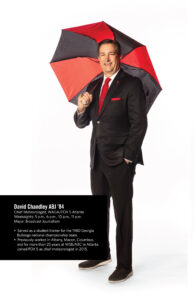 Feldman: I was well into my junior year at UGA when I had that epiphany. Dr. Mote pulled me aside and said I had an aptitude for this. Since we didn’t have a meteorology degree here, my option was to take every weather and climate class the geography department offered, and take every physics and calculus class to try to cobble together something that was as close to a meteorology degree as you could get. Then go to graduate school for meteorology.
Feldman: I was well into my junior year at UGA when I had that epiphany. Dr. Mote pulled me aside and said I had an aptitude for this. Since we didn’t have a meteorology degree here, my option was to take every weather and climate class the geography department offered, and take every physics and calculus class to try to cobble together something that was as close to a meteorology degree as you could get. Then go to graduate school for meteorology.
And, Ella, by the time your group was coming in, that was when the atmospheric science certificate came along, right?
Dorsey: Right, I have a geography degree with the atmospheric science certificate. I did a lot of studying. And every single day, I use the knowledge that I gained from going to UGA.
Chandley: What we do is certainly a great combination of science and communication. First, we take science, but if we can’t tell somebody what we’re talking about, then it doesn’t do us any good. It comes down to connecting with somebody on the other side of that screen. And that’s a challenge, even today. And it’s not so much to get people to watch. My challenge is how do you get somebody to act? When it comes to severe weather, what pushes somebody’s button? What words do we need to use? That’s something we learn as we work.
Feldman: I think that it took me a long time to transition from feeling like I needed to prove to viewers that I knew what I was talking about, versus just being a good communicator, especially in broadcast meteorology. I would argue, in this day and age, sometimes our ability to communicate the forecast is even more important than our ability to put together the forecast.
When I started this, I couldn’t believe somebody was actually paying me to be on TV. I keep waiting for somebody to say, ‘Excuse me, you need to go. Your time is up.'” — David Chandley
GM: What has worked as far as just getting the word out?
Holcomb: People don’t really make an appointment anymore at 6 or 11:00 to watch the news. So it’s our challenge to be where they are and to use new platforms to reach them.
Dorsey: The biggest challenge for people my age is that they get their forecast from the iPhone app, where they open it up and it says 70% chance of rain. The app is wrong a lot of the time. But like Chris said, people my age are not watching local news. So putting your forecasts on your Instagram or on Facebook Live is crucial.
Feldman: It’s about providing the context. It’s so easy to open up the phone and see, like you said, 70% chance of rain today and plan accordingly. But does that 70% chance of rain mean it’s going to rain for five minutes of your day? We have that context.
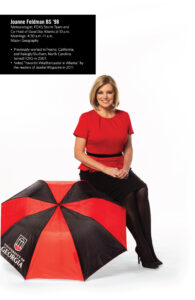 I think authenticity plays a huge part in it also. We are in a career where there are people who are simply in it to have their face on television. I think viewers can see right through that. If you are someone that viewers like and trust, they know you’re being real with them. They will connect with you more. And, hopefully, when that snow is in the forecast, they will come to you for that information.
I think authenticity plays a huge part in it also. We are in a career where there are people who are simply in it to have their face on television. I think viewers can see right through that. If you are someone that viewers like and trust, they know you’re being real with them. They will connect with you more. And, hopefully, when that snow is in the forecast, they will come to you for that information.
GM: This was alluded to earlier, but it’s like you all have different jobs. For instance, Joanne and Ella, you work in the mornings. People start their day with you. The first thing people do is turn on the television to see if they need to wear a jacket.
Feldman: Getting to prepare someone for their day is the part I love most about morning news. But from the lifestyle perspective, it isn’t natural. My alarm clock goes off at 2:30 in the morning, and I do have a family. The hours are a grind.
It’s hard to take care of yourself when you’re getting just a few hours of sleep a night. But I love what I do. This is what I signed up for. And with morning news, viewers in a sense are inviting us into their home. They feel like they know us, and we’re part of their family.
Dorsey: Since I switched to morning news, more people have come up to me and said, “We watch you every morning, and you have changed my life. You make me happy.”
Meeting people whose lives I get to be a part of every day makes all the sacrifice worth it. And when I’m in those moments where I wake up and I’ve gotten two hours of sleep, and I just want to cry, and I’m so exhausted, I remember that there are people out there every day who we’re impacting in a positive way. Not many people can say they do that.
We are in a career where there are people who are simply in it to have their face on television. I think viewers can see right through that. If you are someone that viewers like and trust, they know you are being real with them.” — Joanne Feldman
GM: Joanne, you’ve expanded your work as co-host of Good Day Atlanta at 10 a.m. Tell me about moving into the entertainment side.
Feldman: I love that hour of my day because it is something different. But after you’ve talked about the same forecast for five and a half hours, it is refreshing to step into a completely different role. Because Good Day Atlanta at 10 a.m. is more of an entertainment and lifestyle show, it allows viewers to see a different side of me and maybe connect with me more. I hope I can use that connection when I need viewers’ attention in a serious weather situation. On top of that, it’s just a lot of fun.
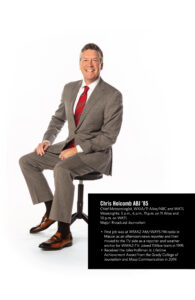 GM: David and Chris, you are both chief meteorologists at your networks. How do you approach that responsibility?
GM: David and Chris, you are both chief meteorologists at your networks. How do you approach that responsibility?
Holcomb: We have to be leaders of our weather department and our weather team. We also need to send reporters to certain areas to cover whether it’s snow or storms coming in. Research shows the No. 1 reason people turn to local news is for weather. We are responsible for that and how it’s going to be covered.
Chandley: I think it’s also our job to kind of set the tone of how we’re going to present the forecast. It’s also important to plan the approach to winter weather or other severe weather. The other thing that surprised me—and I can’t speak for Chris—is the process of hiring people. Ultimately, it’s the news director and the general manager’s decision of who we bring on. But, you know, I had far more input than I thought that I would, and that’s kind of neat, right? You try to bring people in that will fit well with what we’re trying to do, and I think we’ve succeeded in that.
GM: As you all have mentioned, severe weather is when most people will really pay attention to their local meteorologists. How do you handle severe weather and help your viewers get through it?
Holcomb: I think it’s adrenaline. Five hours of wall-to-wall coverage, and you just do it. But we have information that can save people’s lives. We can zoom into street level to show that this hook echo on radar where we have a vortex signature moving into your area. Giving people information that can help them protect their families is what drives us.
We have information that can save people’s lives” — Chris Holcomb
Chandley: You go back to the Newnan tornado we had in March 2021. It went through a big metropolitan area. We were on the air the whole time. I know Chris was on the air too. And I think that we saved lives that day.
Holcomb: You normally can’t see a tornado at night. But we had information from the National Weather Service coming in, and they were using words like “catastrophic.” I think there are visual cues, as well as verbal cues. People can tell in our voices when something dangerous is happening.
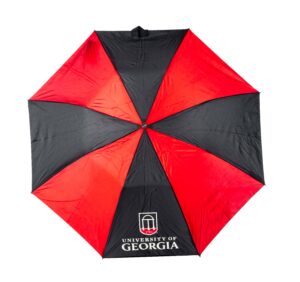 Feldman: And I think that that’s a perpetual challenge in our field. What is the real deal versus something that maybe isn’t quite as concerning? Not all weather is created equal. You can’t always use hyperbolic messages.
Feldman: And I think that that’s a perpetual challenge in our field. What is the real deal versus something that maybe isn’t quite as concerning? Not all weather is created equal. You can’t always use hyperbolic messages.
GM: People clearly are comfortable approaching you and talking about your expertise. How does that feel?
Dorsey: I think people probably connect with meteorologists more than anchors because we’re able to show a little bit more personality. We ad lib a little bit more, and it feels a little bit looser. And because not every news story impacts a person at home, but the weather is always doing that. So, they listen a little bit more. It is really flattering.
Chandley: There’s not a week goes by that I don’t run into somebody that says that I came to their school. I did thousands of those back in the day. I made a connection with a viewer because I went to their fourth-grade class, and they thought enough of it to come up and tell me 40 years later.
Holcomb: Our car was getting serviced, and the 20-something-year-old guy behind the counter was, like, “You spoke to my school. I know who you are.” And I’m thinking, “Great, this is an adult telling me this.”
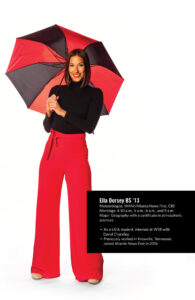 GM: What is special about working in Atlanta and north Georgia?
GM: What is special about working in Atlanta and north Georgia?
Holcomb: I was born here, and I grew up here. And it was always my dream to work in my hometown. And I knew when I was here at UGA that it might be rare. And I knew that I may have to move around. Luckily, I was able to jump from Macon to here. And then the challenge was, “OK, I’ve made it to Atlanta. Now I have to stay.” Atlanta is just such an amazing market, and we’re now the sixth largest market in the country. And we get to forecast all different kinds of weather.
Feldman: Obviously growing up here, this was my home, and I wanted to come back here and work. But you take that first job wherever you can get it. Mine was in Fresno, California. It’s a desert climate, but every now and then I got to forecast a snow storm in the Sierra Nevada or something. But that was about the extent of it. Those first two years of my career gave me a chance to focus on the broadcasting side of things. Then I went to Raleigh, and, now, “Hey look, there is an opening in Atlanta. I do get to work in my hometown.” I hope that I can do this until I’m ready to retire. Not until somebody else tells me I need to retire.
Chandley: When I started this, I couldn’t believe somebody was actually paying me to be on TV. I keep waiting for somebody to say, “Excuse me, you need to go. Your time is up.”
I was born and raised outside of Atlanta, and I came to school here. I never left the state. I’ve worked in Albany, Macon, Columbus, and then Atlanta. I wanted to raise my family here.
I was at Channel 2 for all those years, but I never thought I’d get an opportunity to be a chief meteorologist. I took a leap of faith that that was going to happen, and it did. It turned out wonderfully. It’s hard to believe that was eight years ago.
GM: We’ve talked about the academic side of the university, but what are your favorite memories from your days at UGA?
Feldman: We had so many life events that happen while I was here. I met my husband while I was waiting tables at Red Lobster. And our son was born at St. Mary’s Hospital. So, it’s hard to pick just one good memory. Would it sound like I’m boasting if I say when I won Miss University of Georgia?
Every single day, I use the knowledge that I gained from going to UGA.” — Ella Dorsey
Dorsey: There are so many different memories that I could talk about. Being in a sorority was a great experience. Going to school with all of the professors we talked about was a great experience. But now that my grandparents aren’t here anymore, I think my favorite memory was that they lived 30 minutes down the road in Hoschton.
I was my grandmother’s first grandchild to graduate from UGA and graduate with honors. And then also watching my grandma watch me graduate, I think, is something that I hold even higher now that she isn’t here anymore. And just how proud they were to see me.
Grandma watched me on TV every single day. When she learned how to text, she’d message me: “Ella, the right side of your hair’s messed up.”
This story appears in the Winter 2022 issue of Georgia Magazine



